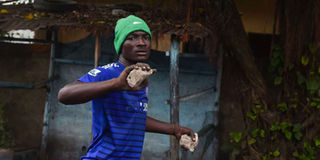Alarm as African countries reel from multiple crises amid endless politicking

An anti-government protester in Lome, Togo early in the week. Opposition parties have called for similar demonstrations. PHOTO | PIUS UTOMI EKPEI | AFP
What you need to know:
In South Africa, the Supreme Court is preparing to hear an appeal relating to 800 corruption charges against President Jacob Zuma that were dropped months ago.
In Angola, the opposition Unita party has been mulling a boycott of parliament, as if taking the cue from Kenya.
As the last quarter of the year approaches, Africa continues to be engrossed in political drama.
Apprehension in countries like Kenya, South Africa and Togo dominates headlines, with base politicking seemingly relegating development to the periphery.
As Kenya remains uncertain of the October 17 presidential poll rerun, Togo is in turmoil following protests.
In South Africa, the Supreme Court is preparing to hear an appeal relating to 800 corruption charges against President Jacob Zuma that were dropped months ago.
The development comes even as Nkosazana Dlamini-Zuma, the president’s former wife, is reportedly poised for a senior cabinet post.
Major elections are also looming, including the one for the leadership of the ruling ANC, in December.
ZUMA DYNASTY
Dlamini-Zuma’s looming appointment is widely viewed as a ruse to perpetuate the Zuma dynasty.
In neighbouring Angola, the opposition Unita party has been mulling a boycott of parliament, as if taking the cue from Kenya.
In the meantime, and sadly for the ordinary Africans, the erstwhile dream of the heralded economic renaissance seems to have dissipated.
Paradoxically, the continent’s political class — mainly made up of the economic elite — seems to be interested in little else but struggle for power and dominance.
For the time being, the imperative of true leadership seems to be lacking even as politicians go for one another’s throats.
Among concerns are such disasters as last month’s landslide and flooding that hit Sierra Leonean capital Freetown.
According to the World Bank, the disaster inflicted an estimated $30 million worth of damage on the country’s economy.
EXPENSIVE
Apart from the loss of lives, there was damage to health and education facilities, industry, transport and housing.
Just last week, the World Bank said it was providing a $82 million package to revitalise the country’s economy.
Ironically, these amounts look like loose change when compared to the mind-boggling expenditure involving elections in Africa.
Kenya’s bungled General Election was billed as possibly the second most expensive in the world.
In a continent notorious for mendicancy and dependency on donors, the Kenyan poll cost well above $500 million.
Other African countries are equally extravagant during elections, with little thought given to economic crises and the welfare of impoverished populations.
Still on disasters, the tiny island nation of Cape Verde has been ravaged by the worst malaria outbreak in decades.
FATALITIES
According to media reports, 184 cases have been recorded since January. The figure is the highest since 1991, with the capital Praia alone recording 170 cases.
Madagascar, yet another island nation, has been reeling from the effects of a pneumonic plague outbreak.
The country has witnessed an outbreak nearly every year since 1980, with the current one resulting in fatalities.
Some 349 people were treated for the disease blamed on factors such as poor hygiene, inadequate healthcare and rats fleeing forest fires.
That aside, a meeting slated for September 20 is expected to assess the situation in war-torn South Sudan, which is still in the stranglehold of a massive humanitarian crisis.
According to the UN Office for Humanitarian Affairs, the number of people displaced in South Sudan rose to nearly four million in the first half of this year.
While there are 1.9 million internally displaced people, two million others have fled to neighbouring countries, with million of them based in Uganda alone.





